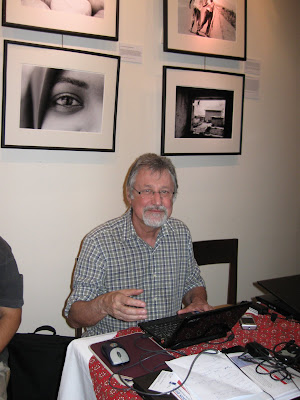Journalists Converge on the Foreign Correspondents Club of Thailand to Cover the Election in Burma

Journalists barred from Burma assemble at the Bangkok FCCT to report on the election in Burma
Foreign Correspondents Club of Thailand. November 7, 2010. Today, Burma is holding its first election in 20 years. Everyone agrees that it’s a faux election, that it’s anything but open and fair, and that the result will be to confirm in power, indefinitely, the dictatorial military regime, which has been governing Burma for most of the past 50 years. But, it’s still a big international story which is making the front pages of papers around the world and is today’s lead story on international broadcast media.
monitors the election from the Bangkok FCCT.
I asked veteran journalist and Burma expert Larry Jagan “Why is so much media attention being given to a fake election controlled by the governing generals? Why isn’t it a big yawn and simply ignored?” Jagan answered that the election itself was something like a storm in a tea cup, but that its real importance lies in what will happen after the election. Jagan’s informed view is similar to that advanced by British Ambassador to Burma, Andrew Heyn, who told the FCCT on Thursday (November 4), that there does exist the possibility that the election might begin a long process of liberalizing change in Burma, which he characterized as the optimistic view, but that no one could predict with any degree of confidence what the secretive generals are up to. Jagan confirmed that most of the talk among reporters and others gathered at the FCCT today, was about the days after the election.
The international media have turned the Bangkok FCCT into a temporary press center because the Burmese regime has barred reporters, as well as election monitors, from entering Burma. Jagan explained to me that normally the press and broadcast media would be camped out at the election commission in Burma and would be going around to the polling places for interviews and to obtain information, but because that was not possible, Bangkok was the next best spot close to the action. Interestingly enough, Thailand has good communication links with Burma, so the reporters at the FCCT can call sources on the ground for information, and there are undercover reporters in Burma who can phone stories into Bangkok.
I saw a good example of this shortly after I arrived at the FCCT. A reporter selected by the assembled press was conducting a searching telephone interview of British Ambassador Andrew Heyn, who was in Rangoon and was able to provide some details of the mood among the Burmese on voting day, the turnout at the polls (light), and other information. The interview, called a “collective interview” by Jagan, was heard over the FCCT’s speaker system, and was able to be used by the assembled media in preparing their stories.
Also in attendance at the FCCT press center, in addition to the journalists, were representatives of NGOs active in Burma, Burmese activists who had fled Burma, and diplomats. By talking together and using each other as resources, the press was able to present as coherent reporting as possible of the election taking place just over the Thai-Burma border.
 Aljazeera News Network, which has a better reputation outside the US than it does within America, had set up a temporary satellite TV studio at the FCCT from which it was broadcasting newsfeeds worldwide, with the Bangkok skyline forming the background. As one can well imagine, it takes a lot of equipment and personnel to make this happen, all of which appears so easy on screen. My thanks to Jeremy Custance, Aljazeera’s News Editor, Asia Pacific, for showing me around the Aljazeera setup, permitting me to photograph his operations, and taking the time to explain to me something of the workings of broadcast journalism.
Aljazeera News Network, which has a better reputation outside the US than it does within America, had set up a temporary satellite TV studio at the FCCT from which it was broadcasting newsfeeds worldwide, with the Bangkok skyline forming the background. As one can well imagine, it takes a lot of equipment and personnel to make this happen, all of which appears so easy on screen. My thanks to Jeremy Custance, Aljazeera’s News Editor, Asia Pacific, for showing me around the Aljazeera setup, permitting me to photograph his operations, and taking the time to explain to me something of the workings of broadcast journalism.As a non-journalist, I found the afternoon utterly fascinating. I admire the creativity of the news people in finding ways to obtain and disseminate information from a closed society whose leaders go to great lengths to control the press. In today’s digital world, thankfully, it is virtually impossible to prevent a total news or information blackout from even the most closed of societies.
The afternoon was not without a moment of humor. It was rumored, unconfirmed, that the Burmese generals were permitting a team of international inspectors in to monitor the election and testify to its legitimacy, headed by the ambassador from North Korea. Yes, North Korea. You read that correctly.





0 Comments:
Post a Comment
<< Home